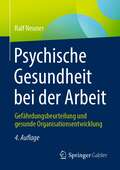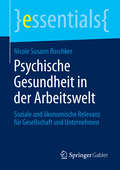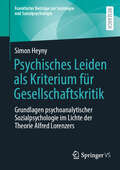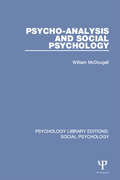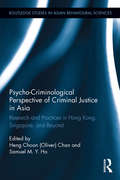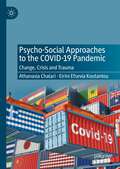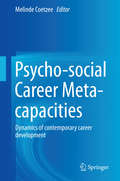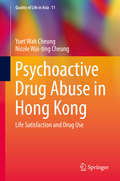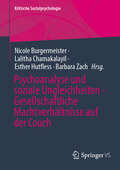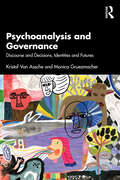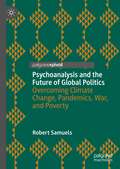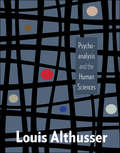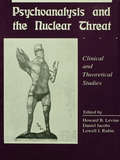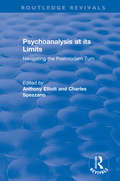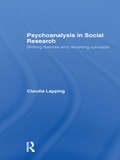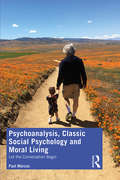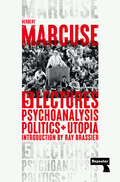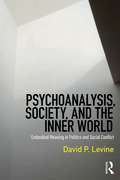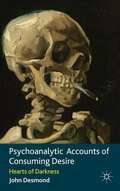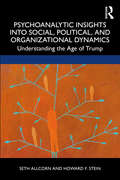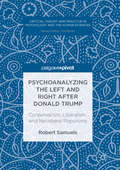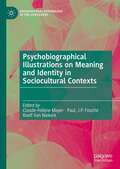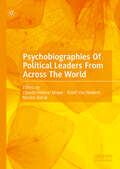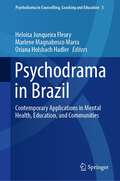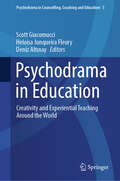- Table View
- List View
Psychische Gesundheit bei der Arbeit: Gefährdungsbeurteilung und gesunde Organisationsentwicklung
by Ralf NeunerDas Buch schlägt die Brücke zwischen Theorie und Praxis. Es klärt die wichtigsten Begriffe rund um das Thema psychische Belastung und geht auf die bestehenden gesetzlichen Verpflichtungen und Aufgabenverteilung ein. Kommentare zu Normen und relevante Gesetze wurden aktualisiert. Die vierte, umfassend überarbeitete und erweiterte Auflage beleuchtet Arbeitskonzepte, die unter den Begriff New Work fallen.Im Hauptteil werden Methoden und Verfahren zur Messung und Dokumentation von psychischen Belastungen erläutert. Dazu hat der Autor einen Darstellungs- und Kriterienkatalog erarbeitet, mit dem sich der Leser die spezifischen Vor- und Nachteile einschlägigen Verfahren zur Ermittlung psychischer Belastung erschließen kann. Die Ergebnisse der Analyse sind Handlungsgrundlage für die gesunde Organisationsentwicklung. Anhand zahlreicher Praxisbeispiele werden Maßnahmen und deren Nutzen zur Verbesserung der Qualität der Arbeitsgestaltung für die Beschäftigten und das Unternehmen aufgezeigt.Das Buch wendet sich an alle Interessierten, die wissen möchten, wie man psychische Belastung bei der Arbeit effektiv erfassen und in der Folge verringern kann. Dazu gehören Fachkräfte für Arbeitssicherheit genauso wie Arbeitsmediziner, Betriebsräte, Personalverantwortlich und alle, deren Anliegen die Verbesserung der Qualität der Arbeitsbedingungen ist.
Psychische Gesundheit in der Arbeitswelt: Soziale und ökonomische Relevanz für Gesellschaft und Unternehmen (essentials)
by Nicole Susann RoschkerExperten weisen seit vielen Jahren auf die ökonomischen und sozialen Folgen hin, die für Unternehmen und Gesellschaft gleichermaßen durch die eklatante Zunahme psychischer Erkrankungen in Zusammenhang mit der Arbeitswelt entstehen. Gleichwohl gilt Gesund¬heit meist noch als rein private Angelegenheit, um die sich der Einzelne selbst zu kümmern hat. Doch Arbeitgeber spielen im Hinblick auf die Gestaltung der Arbeits-bedingungen eine entscheidende Rolle bei der Lösung des Problems. Die Publika¬tion legt dar, warum die Gefährdung der Gesundheit von Beschäftigten bereits jetzt ein Risiko¬potenzial darstellt, das nicht mehr ignoriert werden kann, und weshalb dies als gesellschaft¬liches und ökonomisches Issue Bestandteil der Unternehmens¬berichterstattung sein sollte.
Psychisches Leiden als Kriterium für Gesellschaftskritik: Grundlagen psychoanalytischer Sozialpsychologie im Lichte der Theorie Alfred Lorenzers (Frankfurter Beiträge zur Soziologie und Sozialpsychologie)
by Simon HeynyDie Beschäftigung mit psychischem Leiden ist im Alltag, in Wissenschaft und Öffentlichkeit zu einer Selbstverständlichkeit geworden. Diverse Studien untersuchen mögliche Ursachenzusammenhänge und diskutieren kontrovers das Verhältnis von psychischem Leiden und sozialen Bedingungen und Dynamiken. Simon Heyny untersucht in diesem Buch in interdisziplinärer Weise, ob und inwiefern psychisches Leiden als ein sinnvolles Kriterium für Gesellschaftskritik gelten kann. Auf grundlagentheoretischer Ebene und insbesondere im Rückgriff auf die Arbeiten Alfred Lorenzers werden dabei die Zusammenhänge von psychischem Leiden, sozialen Bedingungen und Dynamiken sowie Varianten der normativen Begründungen von Gesellschaftskritik analysiert. In Ergänzung zu den gängigen Themenfeldern wie Familie und Arbeit werden dezidiert auch migrationsspezifische Momente einbezogen und zur Veranschaulichung theoretischer Gesichtspunkte genutzt. Im Ergebnis wird eine integrative analytische Perspektive ausgearbeitet und für eine formale Ethik sozial vermeidbaren Leidens fruchtbar gemacht. Auf diese Weise wird ein Blick für die Interferenzen, Eigendynamiken und Transformationspotenziale von Psychischem und Sozialem eröffnet.
Psycho-Analysis and Social Psychology (Psychology Library Editions: Social Psychology)
by William McDougallFrom the Preface: ‘In these few lectures delivered in the University of London (May 1935) I have returned to the always interesting, but generally quite futile, task of criticizing the teachings of Professor Sigmund Freud and his school. On the present occasion my criticisms are made with ruthless frankness, in accordance with the policy I have recently adopted. I have realized too late that I might have done more for my chosen science, had I from the first spoken with a less modest voice.’ Originally published in 1936, two years before the author’s death, this title is a critique of the teachings of Freud and his school from a social psychology standpoint. It has several appendices which include the examining of ‘Totem and Taboo’ and the Oedipus complex.
Psycho-Criminological Perspective of Criminal Justice in Asia: Research and Practices in Hong Kong, Singapore, and Beyond (Routledge Studies in Asian Behavioural Sciences)
by Heng Choon Chan Samuel M.Y. HoThis book offers both theoretical and practical examinations of the psycho-criminology of criminal justice in Asia, with particular emphasis on the Hong Kong and Singapore contexts. It is designed to present the current state of the field, which addresses key topics in three major sub-areas – policing and legal system, offender rehabilitation and treatment, and research and future directions. Written by academics with extensive research experience in their respective topics and senior ranking practitioners in their fields, topics include psychologists’ involvement in different aspects of forensic investigation, police emotional reactions to major incidents, the application of psychological approaches in developing offender rehabilitation and treatment modules to address different offender’s criminogenic needs, and legal issues related to the insanity defence, fitness to plead, the jury system, and the procedural justice and legitimacy. An important reference for post-graduate courses, this book will be of special interest to criminologists and psychologists working in forensic settings, mental health professionals, policy-makers, police personnel, prison officials, and legal executives. <P><P>Chapters include: <P><P>1. Youth gang offenders in Singapore <P><P>2. Offender rehabilitation: the Hong Kong Correctional Services Department <P><P>3. Juries as decision makers in East Asian judicial systems: Hong Kong, the Mainland China, South Korea, and Japan <P><P>4. The psychology of violent extremism: what we know and what else we need to do
Psycho-Social Approaches to the Covid-19 Pandemic: Change, Crisis and Trauma
by Anathasia Chalari Eirini Efsevia KoutantouThis book explores how meaning-making during the COVID-19 pandemic, and specifically during the period of the April 2020 lockdowns, may be derived from shared lived experience among participants, residing in diverse geographical regions. This study conducted 46 in-depth interviews with Greek participants residing in 13 district countries and 23 cities around the globe and argues that meaning making of the pandemic derives from shared lived experiences of radical change and everyday transformations, fearful as well as well as hopeful perceptions of crisis and trauma emerging through loss of life before the pandemic.
Psycho-social Career Meta-capacities
by Melinde CoetzeeThis book introduces a coherent perspective on the self-regulatory career meta-capacities that individuals, as career agents, need to successfully manage their career development in a boundaryless occupational world. Enriched by empirical data and case studies by subject specialists in the fields, it serves as a cutting-edge benchmark for specialists, professionals and post-graduate students in the careers field to study. This book allows an in-depth view of the most recent research trends on the critical psycho-social constructs influencing the adaptation, adaptivity, adaptability and employability of individuals in a turbulent, uncertain and chaotic work world. In addition, it offers the practising professional new perspectives of career constructs and measures to consider in career counseling and guidance for the contemporary career.
Psychoactive Drug Abuse in Hong Kong: Life Satisfaction and Drug Use (Quality of Life in Asia #11)
by Yuet Wah Cheung Nicole Wai-ting CheungThis book studies young people’s use of psychoactive drugs and its social and psychological correlates in Hong Kong. Specifically, it focuses on how life satisfaction may affect drug use among a sample of psychoactive drug users in Hong Kong. The book addresses the dearth of research on the role of young people’s life satisfaction in their drug abuse and engagement in other risk behaviors in Hong Kong. It also examines how changes in the drug scene from heroin addiction to psychoactive party drug use since the late 1990s has necessitated a deeper exploration of the subculture of young people, which shapes their attitudes and behaviors regarding how they structure their lives and how they perceive the risks of drug use, in the context of the global trend of normalization of recreational drug use. Readers will benefit from the results of a rigorous analysis of a unique set of longitudinal data that reveals the factors influencing drug use among young psychoactive drug users, academic implications of the findings for social science theory and research on young people’s drug use, and practical implications of the findings for prevention and intervention services for young people in Hong Kong and other Asian societies.
Psychoanalyse und soziale Ungleichheiten - Gesellschaftliche Machtverhältnisse auf der Couch (Kritische Sozialpsychologie)
by Nicole Burgermeister Lalitha Chamakalayil Esther Hutfless Barbara ZachDieser Sammelband geht den unbewussten Wirkungsweisen gesellschaftlicher Machtverhältnisse nach und plädiert dafür, diese auch in der klinischen Praxis zu adressieren und zu analysieren. Darüber hinaus werden in den verschiedenen Beiträgen Themen wie die Bedeutung von Normierungsprozessen in Gesellschaft und Psychoanalyse, die Auseinandersetzung mit Rassismus, Kolonialismus, Antisemitismus, Sexismus, Ableismus, Queer- und Transfeindlichkeit in psychoanalytischer Theorie, Praxis und Ausbildung sowie die Auswirkungen von Rassifizierungsprozessen und Klassenunterschieden in Psychotherapien beleuchtet. Die Autor:innen verbindet die Überzeugung, dass die Psychoanalyse – ihren eigenen Ausblendungen und Reproduktionen von Machtverhältnissen zum Trotz – kritisches, emanzipatorisches und widerständiges Potential in Bezug auf gegenwärtige gesellschaftliche und individuelle Entwicklungen bietet. Mit Beiträgen von Mai-Anh Boger, Elisabeth Brainin, Nicole Burgermeister, Lalitha Chamakalayil, Stephen Hartman, Bernd Heimerl, Esther Hutfless, Kimberlyn Leary, Patricia Porchat, Samy Teicher, Beatriz Santos, Barbara Zach und anonymen Autor:innen.
Psychoanalysis and Governance: Discourse and Decisions, Identities and Futures
by Kristof Van Assche Monica GruezmacherPsychoanalysis and Governance makes a cogent argument for the use of psychoanalytic perspectives in the understanding of governance, the process of collective decision-making that maintains and reshapes communities.This book is highly relevant to those interested in the ever-expanding field of applications of psychoanalysis and for all those willing to observe the discursive and affective underpinnings of public policy, administration, and planning. It locates the potential for self-analysis and self-transformation within governance, yet also indicates governance as the confluence of diverging understandings of the ideas of community and governance itself, as the place where competing desires and variegated patterns of fears and hopes collide and hold the transformational potential to destabilize the community.Building on Freudian, Lacanian, and other psychoanalytic traditions, the book enriches our understanding of governance, the way communities remember and forget, are haunted by the past, remain untransparent to themselves yet also retain the possibility of reinvention, of imagining alternative selves, new futures, and discover paths to move in that direction. This book will be a suitable for psychoanalysts, planners, and all those interested in informed governance.
Psychoanalysis and the Future of Global Politics: Overcoming Climate Change, Pandemics, War, and Poverty
by Robert SamuelsThis book offers a unique approach by using psychoanalytic theory to explain how we can resolve the most important issues facing the world today and in the future. One of my main arguments is that we need to move beyond national politics in order to provide global solutions to global problems. However, there is a misplaced fear concerning global governance, and much of this phobia is derived from a misunderstanding of history and human psychology. Not only do we have to learn to give up our idealized investment in nations and nationalism, but we also have to move beyond seeing the world from the perspective of a victim fantasy. Since we often repress real signs of global progress, we experience the global present and the future in negative ways. To reverse this perspective, we need to first understand the incredible progress humans have made in the last two hundred years, but we also should not ignore the real threats we face.
Psychoanalysis and the Human Sciences (European Perspectives: A Series in Social Thought and Cultural Criticism)
by Louis AlthusserWhat can psychoanalysis, a psychological approach developed more than a century ago, offer us in an age of rapidly evolving, hard-to-categorize ideas of sexuality and the self? Should we abandon Freud's theories completely or adapt them to new findings and the new relationships taking shape in modern liberal societies? In a remarkably prescient series of lectures delivered in the early 1960s, the French philosopher Louis Althusser anticipated the challenges that psychoanalytic theory would face as politics moved away from structuralist frameworks and toward the elastic possibilities of anthropological and sociological thought.Psychoanalysis and the Human Sciences translates Althusser's remarkable seminars into English for the first time, making available to a wider audience the origins and potential future of radical political theory. Althusser takes the important step in these lectures of distinguishing psychoanalysis from psychology and especially psychiatry, which long resisted Freud's analytical concepts of the unconscious and overdetermination. By freeing psychoanalysis from this bind, Althusser can then apply these analytical concepts to the social and the political, integrated with Marxist theory. The result is an enlivened methodology for comprehending social organization and change that had a profound influence on the Frankfurt School and scholars who continue to work at the forefront of radical thought today: Judith Butler, Étienne Balibar, and Alain Badiou.
Psychoanalysis and the Nuclear Threat: Clinial and Theoretical Studies
by Daniel Jacobs Howard B. Levine Lowell J. RubinThe analytic literature has heretofore been silent about the issues inherent in the nuclear threat. As a groundbreaking exploration of new psychological terrain, Psychoanalysis and the Nuclear Threat will function as a source book for what, it is hoped, will be the continuing effort of analysts and other mental health professionals to explore and engage in-depth nuclear issues. This volume provides panoramic coverage of the dynamic and clinical considerations that follow from life in the nuclear age. Of special interest are chapters deling with the developmental consequences of the nuclear threat in childhood, adolescence, and adulthood, and those exploring the technical issues raised by the occurrence in analytic and psychotherapeutic hours of material related to the nuclear threat. Additional chapters bring a psychoanalytic perspective to bear on such issues as the need to have enemies; silence as the "real crime"; love, work, and survival in the nuclear age; the relationship of the nuclear threat to issues of "mourning and melancholia"; apocalyptic fantasies; the paranoid process; considerations of the possible impact of gender on the nuclear threat; and the application of psychoanalytic thinking to nuclear arms strategy. Finally, the volume includes the first case report in the English language - albeit a brief psychotherapy - involving the treatment of a Hiroshima survivor. A noteworthy event in psychoanalytic publishing, Psychoanalysis and the Nuclear Threat betokens analytic engagement with the most pressing political and moral issue of our time, a cultivating of Freud's "soft voice of the intellect" in an area where it is desperately needed.
Psychoanalysis at its Limits: Navigating the Postmodern Turn (Routledge Revivals: Anthony Elliott: Early Works in Social Theory)
by Anthony Elliott Charles SpezzanoHas psychoanalysis become postmodern? How are the various schools of psychoanalysis being altered by postmodernism? What role does psychoanalysis have to play in the cultural debate in postmodern times? Originally published in 2000, Psychoanalysis at its Limits offers a stimulating account of the complex and contradictory nature of psychoanalysis in the postmodern age. It presents a history and critique of the concept of postmodernism throughout contemporary psychoanalytic thought. As such it is a critical survey of the complex relations between desire, selfhood and culture.
Psychoanalysis in Social Research: Shifting theories and reframing concepts
by Claudia LappingThe use of psychoanalytic ideas to explore social and political questions is not new. Freud began this work himself and social research has consistently drawn on his ideas. This makes perfect sense. Social and political theory must find ways to conceptualise the relation between human subjects and our social environment; and the distinctive and intense observation of individual psychical structuring afforded within clinical psychoanalysis has given rise to rich theoretical and methodological resources for doing just this. However, psychoanalytic concepts do not remain the same when they are rearticulated in the context of research. This book traces the reiteration and transformation of concepts in the psychoanalytic theory of Freud, Klein and Lacan, the social theory of Butler, Derrida, Foucault, Laclau and Zizek, and case studies of empirical research ranging from the classic Tavistock Institute studies to contemporary work in politics, gender studies, cultural studies and education. Each chapter explores one cluster of concepts: Melancholia, loss and subjectivity Overdetermination and free association Resistance, reflexivity and the compulsion to repeat Repression, disavowal and foreclosure Psychic defenses and social defenses Arguing against the reification of psychoanalytic concepts, Claudia Lapping suggests the need for a reflexive understanding of the play of attachments and substitutions as concepts are reframed in the contrasting activities of psychoanalysis and research.
Psychoanalysis, Classic Social Psychology and Moral Living: Let the Conversation Begin
by Paul MarcusIn Psychoanalysis, Classic Social Psychology and Moral Living: Let the Conversation Begin, Paul Marcus uniquely draws on psychoanalysis and social psychology to examine what affects the ethical decisions people make in their everyday life. Psychoanalysis traditionally looks at early experiences, concepts and drives which shape how we choose to behave in later life. In contrast, classic social psychology experiments have illustrated how specific situational forces can shape our moral behaviour. In this ground-breaking fusion of psychoanalysis and social psychology, Marcus gives a fresh new perspective to this and demonstrates how, in significant instances, these experimental findings contradict many presumed psychoanalytic ideas and explanations surrounding psychoanalytic moral psychology. Examining classic social psychology experiments, such as Asch’s line judgement studies, Latané and Darley’s bystander studies, Milgram’s obedience studies, Mischel’s Marshmallow Experiment and Zimbardo’s Stanford Prison Experiment, Marcus pulls together insights and understanding from both disciplines, as well as ethics, to begin a conversation and set out a new understanding of how internal and external factors interact to shape our moral decisions and behaviours. Marcus has an international reputation for pushing boundaries of psychoanalytic thinking and, with ethics being an increasingly relevant topic in psychoanalysis and our world, this pioneering work is essential reading for psychoanalysts, psychoanalytic psychotherapists, moral philosophy scholars and social psychologists.
Psychoanalysis, Politics, and Utopia: Five Lectures
by Herbert MarcuseAn impassioned plea for overcoming capitalism, whose urgency is more timely today than when it was first published fifty years ago.Back in print after fifty years and with a new introduction by Ray Brassier, this often overlooked but prescient collection of Marcuse's lectures makes an impassioned plea for the overthrowing of capitalism.Analysing the work of Freud and Marx, and taking in topics like automation, work, postcapitalism, utopia, and technology, Psychoanalysis, Politics, and Utopia excavates the psychic roots of the current crisis of capitalist civilisation, and gives us a blueprint for the emancipation of humanity from the toils of capitalism.In a world reeling from the ongoing collapse of the neoliberal consensus, coupled with the accelerating pace of catastrophic climate change wrought by capitalism, Marcuse&’s radical insights in Psychoanalysis, Politics, and Utopia are as urgently relevant today as they were in 1970.
Psychoanalysis, Society, and the Inner World: Embedded Meaning in Politics and Social Conflict
by David P. LevinePsychoanalysis, Society, and the Inner World explores ideas from psychoanalysis that can be valuable in understanding social processes and institutions and in particular, how psychoanalytic ideas and methods can help us understand the nature and roots of social and political conflict in the contemporary world. Among the ideas explored in this book, of special importance are the ideas of a core self (Heinz Kohut and Donald Winnicott) and of an internal object world (Melanie Klein, Ronald Fairbairn). David Levine shows how these ideas, and others related to them, offer a framework for understanding how social processes and institutions establish themselves as part of the individual’s inner world, and how imperatives of the inner world influence the shape of those processes and institutions. In exploring the contribution psychoanalytic ideas can make to the study of society, emphasis is placed on post-Freudian trends that emphasize the role of the internalization of relationships as an essential part of the process of shaping the inner world. The book’s main theme is that the roots of social conflict will be found in ambivalence about the value of the self. The individual is driven to ambivalence by factors that exist simultaneously as part of the inner world and the world outside. Social institutions may foster ambivalence about the self or they may not. Importantly, this book distinguishes between institutions on the basis of whether they do or do not foster ambivalence about the self, shedding light on the nature and sources of social conflict. Institutions that foster ambivalence also foster conflict at a societal level that mirrors and is mirrored by conflict over the standing of the self in the inner world. Levine makes extensive use of case material to illuminate and develop his core ideas. Psychoanalysis, Society, and the Inner World will appeal to psychoanalysts and to social scientists interested in psychoanalytic ideas and methods, as well as students studying across these fields who are keen to explore social and political issues.
Psychoanalytic Accounts of Consuming Desire
by John DesmondProvides an accessible introduction to psychoanalytic explanations of consumer desire. Topics are drawn widely to reflect the scope of Freud's vision and include dreams, sexuality and hysteria. Discussion is widened to selectively include authors such as Melanie Klein and Jacques Lacan, and to include evaluation of current research.
Psychoanalytic Insights into Social, Political, and Organizational Dynamics: Understanding the Age of Trump
by Seth Allcorn Howard F SteinThis fascinating interdisciplinary work explores U.S. politics since 2015 and offers psychodynamic insights into the unconscious undercurrents of contemporary culture and politics in the United States. Allcorn and Stein expertly lead readers up the steep learning curve of understanding the Trump era by exploring seven key elements of recent political dynamics. Using the complementary psychodynamic models of object relations, Group Relations and Karen Horney’s tripartite theory, this book makes sense of the Age of Trump and its chaotic world of alternate facts, conspiracy theories, reality TV politics, hoax pandemics, and the sweeping chaos of life in the United States. This sense-making relies on two triangulations. The first represents the complex systemic political scene. The second uses three psychoanalytic theories to understand social, political, and organizational dynamics. This book is a key resource for helping readers know and understand ourselves, our fellow citizens, colleagues, family, friends and what Trump and his followers call "them" such as liberals and foreign immigrants, as well as both the larger polarized social and political context in the United States today. The book also provides concrete examples of how these discoveries can be operationalized both in organizations and at the level of national government and leadership. This book is an essential reading for students in organizational behavior including leadership and how governments operate, as well as behavioral health professionals consulting or offering therapy to organizations.
Psychoanalyzing the Left and Right after Donald Trump
by Robert SamuelsThis book outlines a new model for global social justice movements that is based on Freud and Lacan's central insights regarding the unconscious, repetition, drives, and transference. Since most of our current social issues are global in nature, Bob Samuels convincingly argues that we need a global solution, but that global solidarity is blocked by narcissistic nationalism and the capitalist death drive. In examining contemporary social movements for global justice, Samuels articulates a comprehensive theory of non-pathological social solidarity, and argues that in the age of multinational corporations and global climate change, we need a new model of global justice and government that requires an understanding of analytic neutrality and free association. This book uses psychoanalytic theories and practices to explain how someone like Trump can rise to power, and explores why liberals have failed to provide a convincing or effective political alternative. It will be compelling reading to students and teachers in a range of psychological and political disciplines, and to anyone interested in psychoanalysis and current politics.
Psychobiographical Illustrations on Meaning and Identity in Sociocultural Contexts (Sociocultural Psychology of the Lifecourse)
by Claude-Hélène Mayer Paul, J. P. Fouché Roelf Van NiekerkThis book explores psychobiography with focus on meaning making and identity development in the life and works of extraordinary individuals. Meaning-making and identity development are existential constructs influencing psychological development, mental health and wellbeing across the lifecourse. The chapters illustrate through the eyes of 25 international psychobiographers various theoretical and methodological approaches to psychobiography. They explore how individuals, such as Angela Merkel, Karl Lagerfeld, Henri Nouwen, Vivian Maier, Charles Baudelaire, W.E.B. du Bois, Loránt Hegedüs, Kim Philby, Zoltan Paul Dienes, Albertina Sisulu, Ruth First, Sokrates, and Jesus construct their lives to make meaning, develop their identities and grow as individuals within their sociocultural contexts. The texts provide deep insight into life’s development.
Psychobiographies Of Political Leaders From Across The World
by Claude-Hélène Mayer Roelf Van Niekerk Moshe BanaiThe authors explore the life and leadership of extraordinary political leaders in different socio-cultural contexts and epochs and present new insights in political psychobiography. They investigate the lives, personalities, politics, philosophies, careers, leadership and leadership styles of leaders from the UK, Germany, France, South Africa, China, Turkey and Zimbabwe and lead discourses on the advancement of contemporary theories and methodologies. A must read to understand leaders and leadership in historical, contemporary, cultural and intercultural perspectives!
Psychodrama in Brazil: Contemporary Applications in Mental Health, Education, and Communities (Psychodrama in Counselling, Coaching and Education #3)
by Heloisa Junqueira Fleury Marlene Magnabosco Marra Oriana Holsbach HadlerThis book approaches contemporary psychodrama from many contexts and population application from different regions of Brazil. It presents the diversity of local culture, the originality with which psychodramatic philosophy emerges in the Brazilian scenario. It introduces the theoretical-methodological procedures that reaffirm psychodrama as a scientific instrument of social action. The chapters cover the philosophical and theoretical foundations and the new socio-psycho-educational methodologies applied in clinical practices, sociotherapy, politics and society. It is a helpful resource for professionals and academics interested in the development of innovative applications of Psychodrama.
Psychodrama in Education: Creativity and Experiential Teaching Around the World (Psychodrama in Counselling, Coaching and Education #5)
by Scott Giacomucci Heloisa Junqueira Fleury Deniz AltınayThis comprehensive volume synthesizes decades of experience from psychodrama educators around the world. It provides theoretical foundations for practice and presents a diverse range of educational tools suitable for various types of learners. It approaches the educational field with creativity and innovation, presenting different models from diverse educational settings. The chapters include psychodramatic techniques in education. It addresses the needs of educators with different cultural backgrounds and provides specific resources tailored to educational fields such as helping professionals, organizations, lawyers, human development, and education. Each chapter stands alone as a complete resource while forming an interconnected part of the book. The book emphasizes the value of creative and action-oriented methods in engaging students, offering updated tools based on extensive research and the lifelong experiences of professionals from diverse geographical and cultural backgrounds. With its wealth of practical insights and innovative approaches, this book equips educators with the necessary tools to enhance their teaching practices and create transformative learning experiences for students. The book interests university professors, teachers, graduate students, educators, and trainers across various disciplines.
